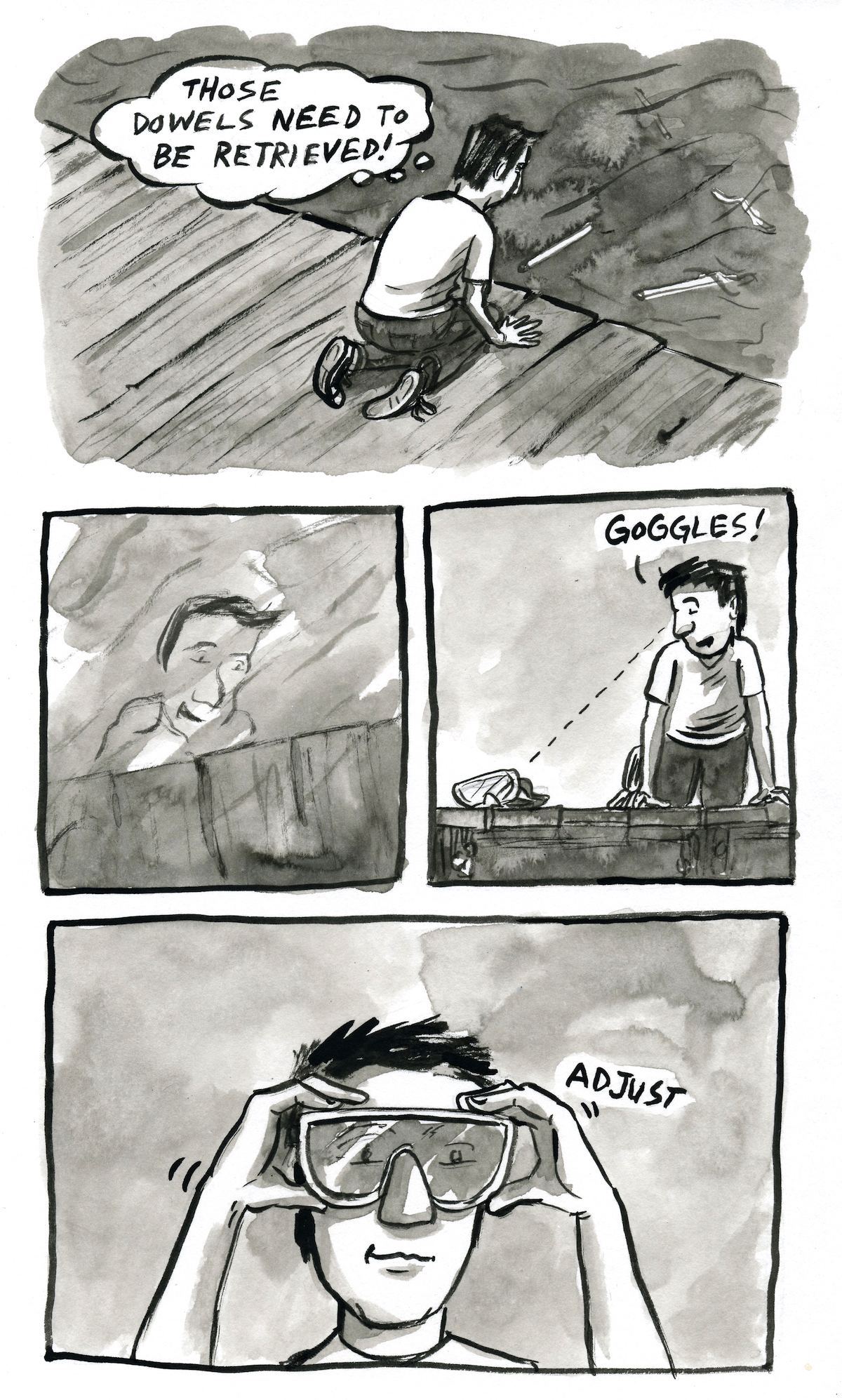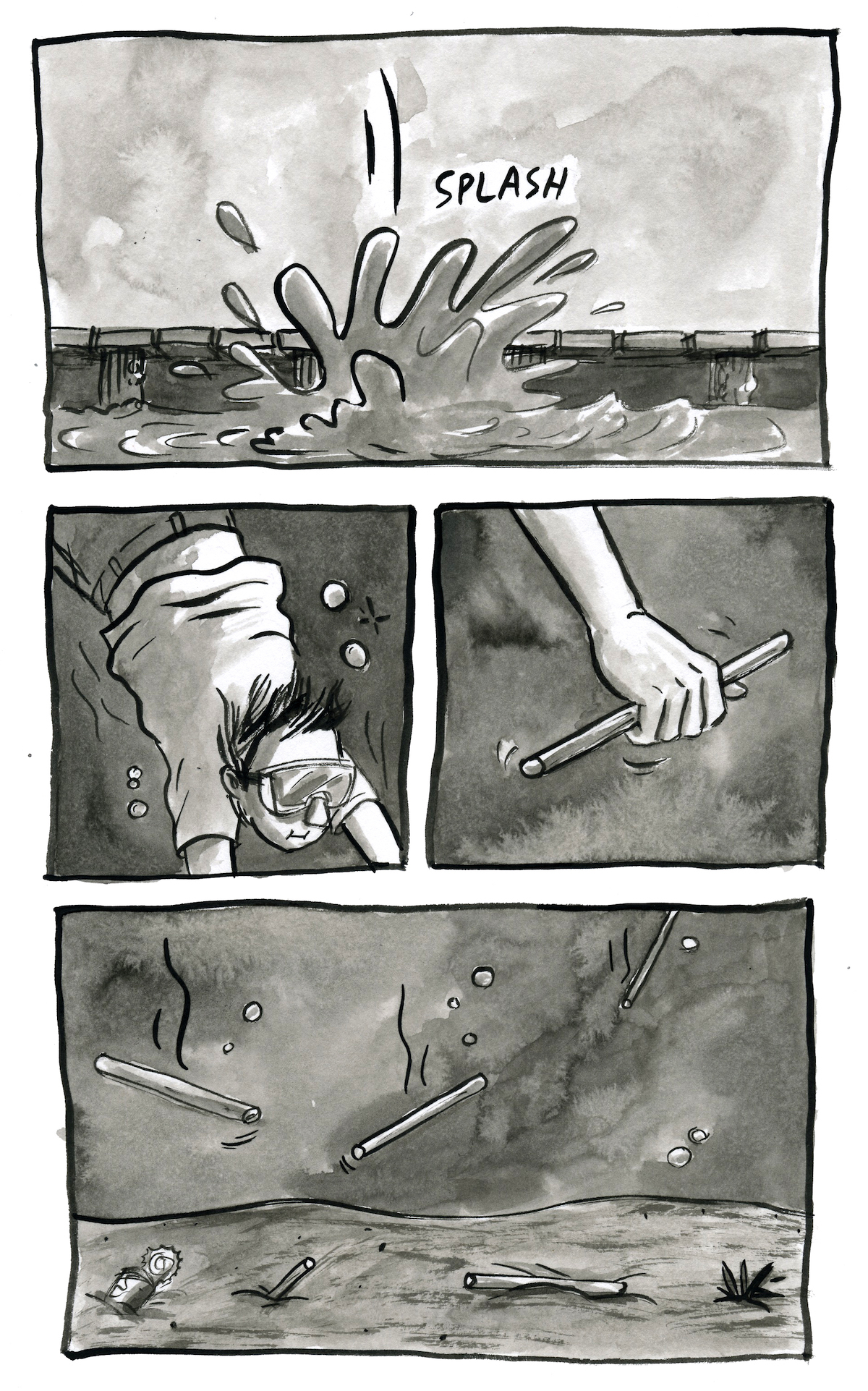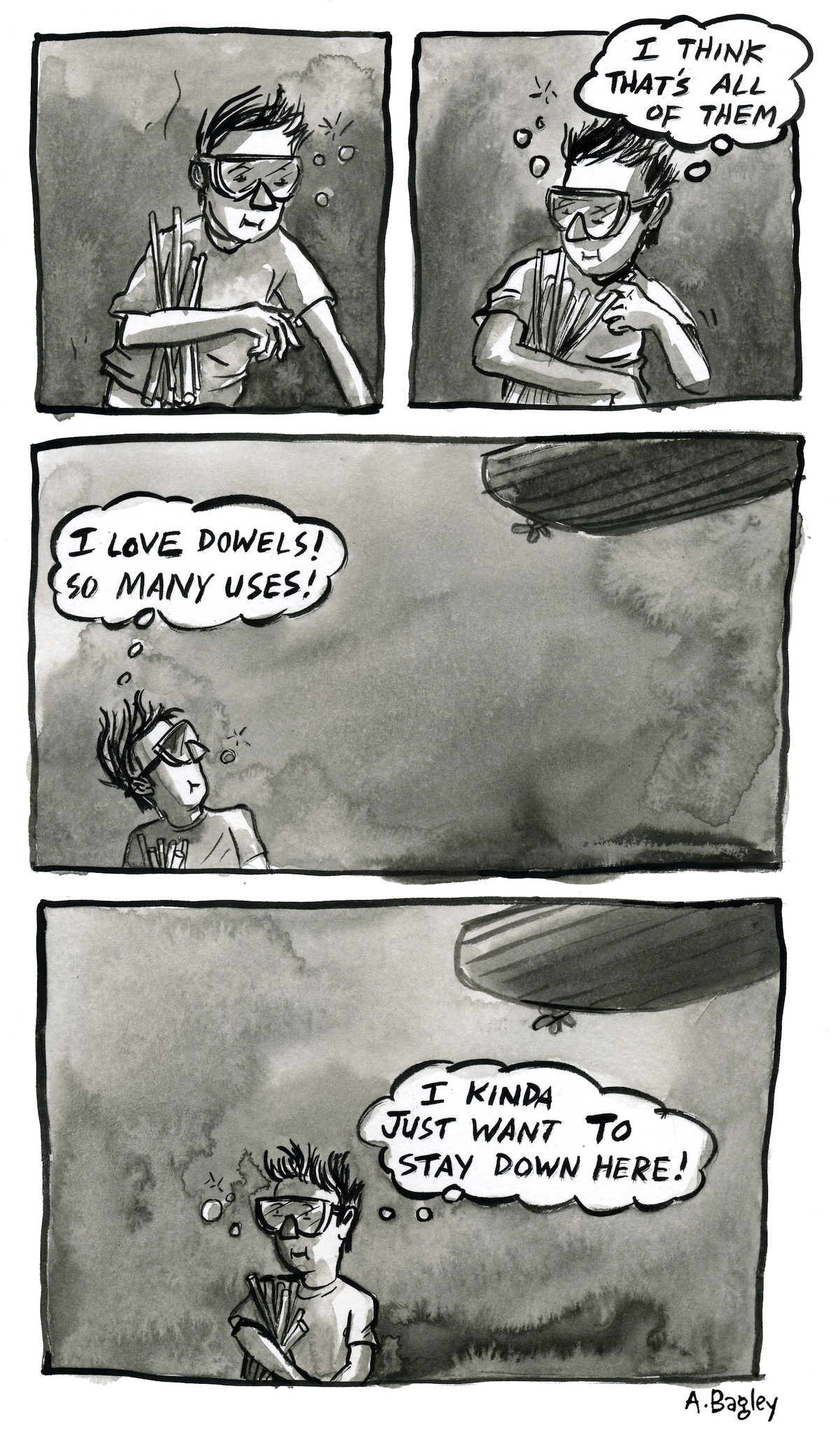Fish for a lifetime
Published October 02, 2018, at 11:59am
Sierra Golden's debut poetry collection looks at the world from the deck of a commercial fishing vessel.
See you Later, Grapefruit
Lately, exes have been sneaking into my dreams,
and other places of suspended thought. Like
when I’m swimming laps, my body blue
and liquid as the water holding me.
They wave. They smile. They flicker
along the blue-floor depths of the deep end.One shows up to ask if I think he’ll look good
with dread locks. Another shows up with his dog
to ask if I still love her. And anotherreminds me of the summer he made a movie
in which I played a young girl learning French,
my only lines words I already knew. And because
he was poor, or young, or in a hurry
there was only one take. And because
I was nervous, or lonely, or young
I remembered only two phrases,
which I purred,
again and again,
in my lowest,
breathiest voice,
the way I’d seen Jean Seburg whisper
to Jean-Paul Belmando in Breathless.And even in the final scene, in which
I was supposed to have been hit by a car and killed,
I wouldn’t die,
but looked straight into the camera
propelled by my too-sudden death —
and kept humming:
à bientôt, pamplemousse, à bientôt.
Celebrate with the Washington State Book Award winners on October 13
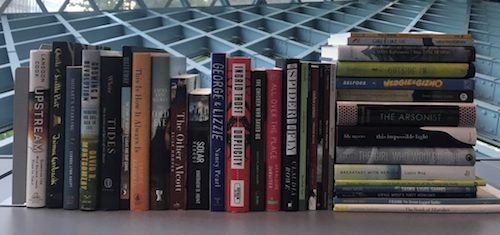
On October 13, this week's sponsor — the Washington Center for the Book — is hosting the ceremony and celebration for the 2018 Washington State Book Awards. This is Washington's iconic regional award; there are 36 finalists, criss-crossing county and genre lines: Claudia Castro Luna, Geraldine DeRuiter, Laurie Frankel, Nancy Pearl, and many many others.
The announcement of the winners is only a small part of the evening. The celebration is at Seattle's Central Library, and almost all of the finalists are scheduled to attend. After the formal ceremony, the third floor of the library opens up for an after-hours celebration: snacks, drinks, and a chance to talk with a group of people who are unlikely to be in the same room for any other occasion.
Come out and celebrate with them! Visit our sponsor feature page for more information and full list of finalists. We hope to see you there.
Sponsors like the Washington Center for the Book make the Seattle Review of Books possible. Did you know you can sponsor us, too? There are only two slots remaining in 2018, so grab this chance to get your stories, or novel, or event in front of our passionate audience. Take a glance at our sponsorship information page for dates and details.
Your Week in Readings: The best literary events from October 1st - 7th
Monday, October 1: Uncompromising Honor Reading
The best sci-fi bookstore in town brings David Weber to Seattle. Weber's latest Honor Harrington adventure has been in the making for five years, and UBS customers get to read it one full day before everyone else. University Book Store, 4326 University Way N.E., 634-3400, http://www2.bookstore.washington.edu/, 7 pm, free.
Tuesday, October 2: Bookish Trivia
All this month, the library is hosting Booktoberfest events around town at bars and other nontraditional venues. Tonight is a bookish trivia night (maximum team size is eight people) and if you're thinking of going alone, don't fear: they'll help match you with other book-lovers. This is a great way to meet people with similar interests. Naked City Brewery, 8564 Greenwood Ave N, 838-6299, http://www.nakedcitybrewing.com/, 7 pm, free.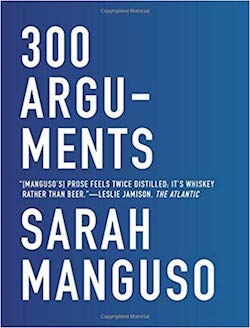
Wednesday, October 3: Word Works: Sarah Manguso
You probably know Manguso from last year's 300 Arguments, an autobiographical inquiry into what it means to be human in this time. It was one of the most exciting books to be published over the last few years. Tonight, Manguso will give a craft talk about authority at the new Hugo House.
Hugo House, 1634 11th Avenue, 322-7030, http://hugohouse.org, 7 pm, $15.
Thursday, October 4: Lit Crawl Fundraiser and Kickoff
Last week, I interviewed Lit Crawl's managing director, Jekeva Phillips, and Lit Crawl programmer Anastacia-Renée about why Lit Crawl is so fun and still somehow free. Phillips had this to say:
A big reason why it’s free is because of our fundraiser on October 4th. We have fun things we’re going to be auctioning off — items with different price ranges. We’ll have things on the cheaper side that are better for our writer and artist friends, but we’ll also have items like a voiceover class and different works of art.
We wanted to bring some fun stuff to the Lit Crawl fundraiser kickoff party this year, which is why we asked Briq House. She’s a body-positive burlesque performer, and she’ll be doing a literary/Halloween-themed burlesque dance. We love books, but we also love to party.
What more do you need to know? Get out to this event, get excited for next week's Lit Crawl, and help keep the celebration free.
Capitol Cider, 818 E. Pike St., 397-3564, 7 pm, $5, 21+.
Friday, October 5: Denise Levertov Award
For this 15th annual award celebrating the life and work of Denise Levertov, poet and activist Carolyn Forché will be celebrated for her work with poetry and religion and faith. There will be an award ceremony, a talk, and a reception with wine and food.
Hugo House, 1634 11th Avenue, 322-7030, http://hugohouse.org, 7:30 pm, free.
Saturday, October 6: The Slow Art Book Launch Party and Gramma Reading Series #2
See our Event of the Week column for more details.
Artspace Hiawatha Lofts, 843 Hiawatha Pl S, Seattle, 709-7611, http://www.artspacehiawatha.com, 5 pm, free.
Erickson Theater, 1524 Harvard Ave, https://gramma.press/, 7 pm, $12.
Sunday, October 7: COAST | NoCOAST Reading
COAST | NoCOAST, an experimental literary magazine formerly known as Northside Review, has staff in Ohio and Seattle. Today, the Seattle office is celebrating a brand new issue with a group reading at the best damn poetry bookstore in the United States. Open Books, 2414 N. 45th St, 633-0811, http://openpoetrybooks.com, 5 pm, free.
Literary Event of the Week: The Slow Art book launch party and Gramma Reading Series #2

I'm not asking for your pity or anything, but sometimes picking one best literary event for every day of the week is difficult business. It requires me to make some really hard choices, and I have to leave a lot of great events out of the calendar.
I've created a sort of streamlined decision-making process that helps with some of the tough calls. For instance, if I have to choose between a great out-of-town author and a local author's book release party, for instance, I'll choose the local author. (This isn't the Touring Author Review of Books, after all.) And if I'm choosing between a recurring event and a unique, one-time-only deal, I'll often bite down hard and pick the single-serving event.
But holy crap, this Saturday is a hard choice.
On the one side, we've got a book release party for Seattle poet (and Seattle Review of Books's September Poet in Residence) Sierra Golden's very first poetry collection, The Slow Art. Golden's book is a poetic account of her time in the commercial fishing industry. (Read my interview with Golden here.) To celebrate her book's debut, Golden will be joined by local poets Maya Jewell Zeller and Sierra Nelson. And a country rock band called Lo-Liner will perform in between the readings.
But then we have the second installment of local publisher Gramma's reading series. The headliner is Pulitzer-winning poet Tyehimba Jess, which is a hell of a coup. Jess will be joined by celebrated Iranian-American poet Kaveh Akbar and Seattle's Civic Poet, Anastacia Renée. So that's a hell of a mix of local and out-of-town talent. And there's more: the evening will also include Moonshine, a diverse cabaret featuring movement and music and exuberant artistic expression.
So that's two events with local ties celebrating local talent with music and readings. How the hell do I pick one over the other? The answer is: I don't. I'm going to leave this choice up to you. See? How do you like it?
Release party for The Slow Art: Artspace Hiawatha Lofts, 843 Hiawatha Pl S, Seattle, 709-7611, http://www.artspacehiawatha.com, 5 pm, free.
Gramma Reading Series #2: Erickson Theater, 1524 Harvard Ave, https://gramma.press/, 7 pm, $12.
The Sunday Post for September 30, 2018
Each week, the Sunday Post highlights a few articles we enjoyed this week, good for consumption over a cup of coffee (or tea, if that's your pleasure). Settle in for a while; we saved you a seat. You can also look through the archives.
Murmuration: The sound of many voices speaking, quietly alone but deafeningly together. The sight of multitudes in flight coming abruptly into sync. An emergence into visibility; a rising up. An uprising.
Speak Truth to Power
Lacy M. Johnson on speaking out about sexual assault. In addition to her own story — of finding her tongue, and the hostile backlash from male peers, the discomfort of other women — she reminds us of what boys-will-be-boys looks like to women who are violated privately, then publicly, by their assaulters.
All across the country this situation is replicated with slight variations: a woman reports rape, is told that boys will be boys; a woman reports rape, is not believed. She is shamed. She is ostracized, traumatized, and retraumatized. At best, the woman’s life is forever and irrevocably changed. At worst, she self-destructs. Men, however, seem to thrive in a culture in which they can rape women with near impunity.
I know, I know. Not all men.
Everything I can remember.
Jessica Shortall remembers the men in her life.
This week, a man sent me a private message on twitter. I told him I did not want to talk to him. He persisted. I told him to fuck off. He replied that he would “teach” me “what sexual assault means.”
They Don’t Want to Know
Rebecca Solnit on having the power to choose not to know.
What has in the past been subtle is now obvious: this is a battle over whether this will be a country for all of us, a democracy in which everyone matters and all are equal, or a citadel of white male privilege. They are a minority — including babies and boys, white males make up a third of this country — but have majority party and are in a rageful panic about its ebb. This nomination is a power grab for the party committed to representing them at everyone else’s expense. That’s out in the open now; that clarity may mean that even if they win this battle, they’ve committed themselves to losing the war.
What a Good Boy
Rebecca Traister with more on power and how it's preserved, through fear and subjugation.
The lesson of the United States in this moment is that misogyny and racism aren’t disqualifiers. They are the qualities the right wing considers key to their larger project — perhaps, in fact, main selling points. (Especially for their president, who today was reported to have loved Kavanaugh’s blustering, aggressive attitude toward his questioners).
After all, the reason that Republicans want to jam through Kavanaugh’s nomination is that as a member of the Supreme Court he’ll be able to help create the mechanisms that determine which kinds of Americans have rights, protections, autonomy, and power.
"I Was Ashamed”
Emily Jane Fox talks to Holton-Arms alums, women who attended the same private school as Dr. Christine Blasey Ford, women whose experiences have an eerie familiarity. A blunt article, whose force grows directly from its straightforward, unemotional reporting.
Many witnessed moments like the one Ford described, or heard about them, or experienced them firsthand. “When I first read the story on Sunday, I said, ‘Of course this happened,’” a woman who graduated from Holton in the early 2000s told me. “This happened so much that there was nothing difficult to believe about what she’s saying. How could anyone doubt this? It felt personal to a lot of us, because her story is so similar to a lot of ours, and so the attacks on her felt personal.”
Trouble in Lakewood
Finally, a flashback to 1993, to Joan Didion, to Lakewood, California, to the tactics so readily used by certain men to discredit and disarm women who have been brutally harmed.
One of the ugliest and most revelatory of the many ugly and revelatory moments that characterized the television appearances of Spur Posse members this spring occurred on “Jane Whitney,” when a nineteen-year-old Lakewood High graduate named Chris Albert (“Boasts He Has 44 ‘Points’ for Having Sex with Girls”) turned mean with a member of the audience, a young black woman who had tried to suggest that the Spurs on view were not exhibiting what she considered native intelligence.
“I don’t get—I don’t understand what she’s saying,” Chris Albert at first said, letting his jaw go slack, as these boys tended to do when confronted with an unwelcome, or in fact any, idea.
Another Spur interpreted: “We’re dumb. She’s saying we’re dumb.”
"What education does she have?" Chris Albert then snarled, and tensed against his chair, as if trying to shake himself alert. "Where do you work at? McDonald's? Burger King?" A third Spur tried to interrupt, but Chris Albert, once roused, could not be deflected: "$5.25? $5.50?" And then there it was, the piton, driven in this case into not granite but shale: "I go to college."
Murmuration. A rising up of many voices. An emergence into visibility.
An uprising.
Whatcha Reading, Stesha Brandon?
Every week we ask an interesting figure what they're digging into. Have ideas who we should reach out to? Let it fly: info@seattlereviewofbooks.com. Want to read more? Check out the archives.
Stesha Brandon is a wonder. Formerly of Town Hall Seattle and University Book Store, Stesha is currently the Literature & Humanities Program Manager at Seattle Public Library, and serves as board president at Seattle City of Literature. Other volunteer service includes the Bumbershoot Task Force, the Washington State Book Awards jury. When she's not reading, Stesha keeps chickens, knits, and bakes tasty treats. On that last point, a point of editorializing: if you've been the beneficiary of Stesha's baked goods, you understand just how much "tasty treats" is totally underselling her absolutely divine pastries.
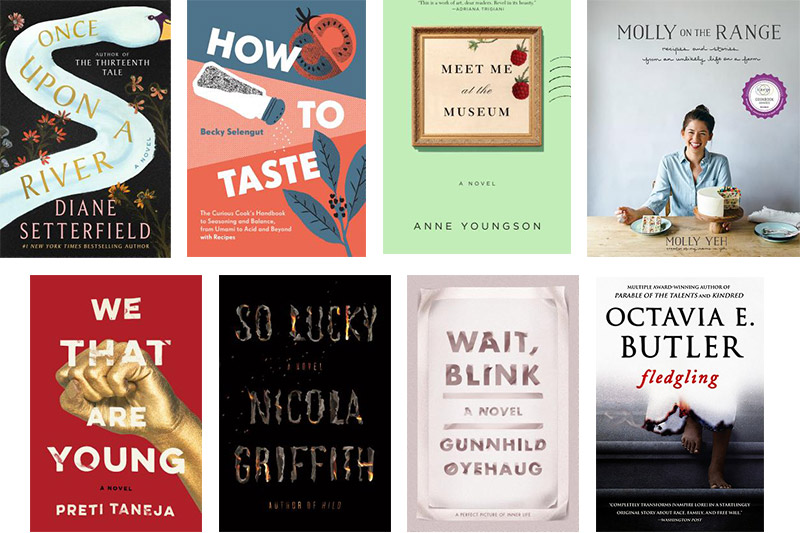
What are you reading now?
I’m finishing up Diane Setterfield’s forthcoming book, Once Upon a River. It’s eerie and atmospheric and feels a little like a fairy tale. The story centers on a young girl who may have been drowned, and then comes back to life. It doesn’t come out until December, but it feels perfect for a fall/winter read.
I’m also reading local chef and author Becky Selengut’s newest book How to Taste, which is super interesting. It talks about how our taste functions and has experiments/recipes so the reader can experience firsthand what Becky is talking about.
What did you read last?
I just finished listening to Meet Me at the Museum, which is an epistolary novel of two letter writers, one in England and one in Denmark, and how their connection shapes their lives.
And anyone who knows me knows that I read cookbooks like novels. I just finished Molly on the Range, by Molly Yeh. It has a wide array of recipes that highlight that she’s a city transplant into Midwest farm life.
What are you reading next?
This list is always long and gets longer by the day! I’ve got a big stack of books waiting, but I’m excited to read We That Are Young by Preti Taneja. It’s a resetting of King Lear in contemporary India. I’m also looking forward to reading Nicola Griffith’s So Lucky. Nicola is one of the most interesting people writing these days, and I can’t wait to dive into her newest book. I’ve also just checked out Wait, Blink by Gunnhild Øyehaug — a Norwegian novel on the longlist for the National Book Award in Translation and Fledgling by Octavia Butler. I’ve read several of her books, but somehow never got to this one.
The Help Desk: A list of men to avoid
Every Friday, Cienna Madrid offers solutions to life’s most vexing literary problems. Do you need a book recommendation to send your worst cousin on her birthday? Is it okay to read erotica on public transit? Cienna can help. Send your questions to advice@seattlereviewofbooks.com.
Dear Cienna,
Now that DFW has been called out in #MeToo by Mary Karr, and the Shitty Media Men list has been made public, I'm wondering if you could make like a Quantico professor and offer us a profile of the kind of asshole we should avoid?
Dizzy and disillusioned, Bellingham
Dear DD,
Wouldn't it be grand if life were that easy? I wish we could assemble one profile and be done with it. I also wish surreptitious gropers willingly wore mittens and would-be rapists wore chastity sandwich boards to curb their destructive, dehumanizing behavior. Sadly, shitty men evolve with each new generation and the only unifying factor seems to be that they view women at best as second-class citizens, or at worst as objects, and few shitty men are going to respond truthfully to the question "do you view women as second class citizens or objects?" when asked – not even Supreme Court justice nominees, and you'd think those sitting on the highest court in the land would place even more weight than the general public on the truth, wouldn't you?
That said, my great grandmother Goldie, who was named after a horse, had a few timeless guidelines for evaluating men to avoid. Over the years, I've added to her list:
- Men who have a bad relationship with their mother or sisters.
- Men who name their daughters after farm animals.
- Men who themselves are named after guns.
- Men who now think it's clever to over-utilize the phrase "me too" in conversation.
- Or who opt to play devil's advocate in any discussion about sexual assault or abortion.
- Or who are eager to point out that sexual assault accusations ruin men's lives.
- Or argue that sexual assault accusations are a grand conspiracy to silence and subjugate men.
- Men who wear flip-flops to work.
I hope that helps.
Kisses,
Cienna
Portrait Gallery: Jordan Alam
Each week, Christine Marie Larsen creates a new portrait of an author or event for us. Have any favorites you’d love to see immortalized? Let us know
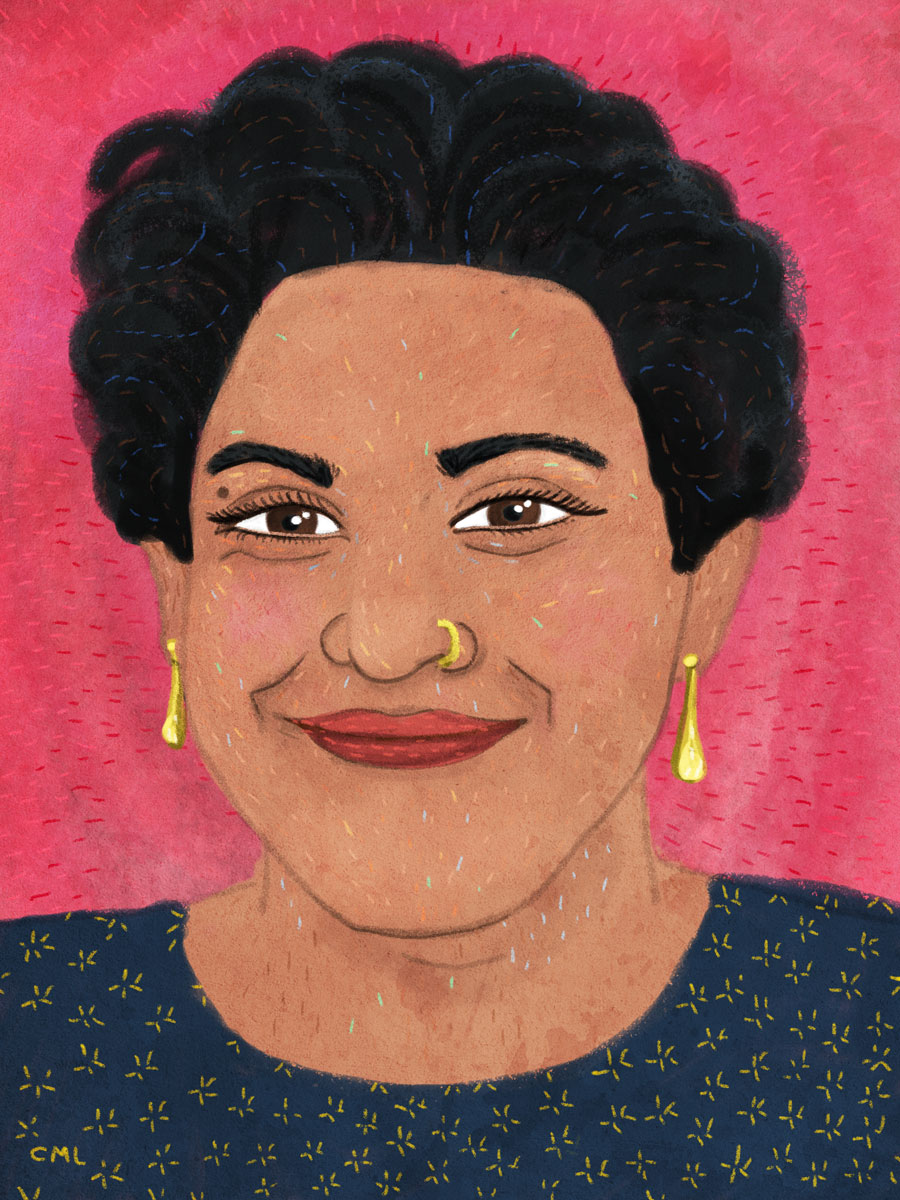
Thursday, September 27:
South Asian Writers of the Pacific Northwest
This Saturday, Hugo House is reopening its doors, on the ground floor of a big fancy new building Starting at 5 pm and running until late, the House will be hosting a sprawling, free-form literary party to introduce the new halls and classrooms and event spaces to Seattle.
Help the Hugo House celebrate its first week in operation since moving back home with a passel of local authors including Jordan Alam, Azura Tyabji, Jasleena Grewal, Shankar Narayan, and your host Sonora Jha.
Hugo House, 1634 Eleventh Avenue, 322-7030, http://hugohouse.org., 7 pm, free.
Criminal Fiction: Rolling through it
Every month, Daneet Steffens uncovers the latest goings on in mystery, suspense, and crime fiction. See previous columns on the Criminal Fiction archive page
Reading around: new titles on the crime fiction scene
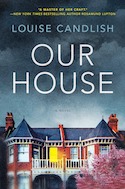
Talk about domestic suspense: from the moment that Fiona Lawton arrives home one day to find that a couple have moved in and all her belongings have been moved out (well, apart from a sad roll of toilet paper), the psychological thriller that is Our House by Louise Candlish (Berkley), hits critical mass and maintains it. Weaving back and forth between Fi’s story via a true-crime podcast and the separate narrative of her husband, Bram, will keep your mind dancing – and your heart more than a little bit petrified. There are fiendish matters afoot here and some of the darker sides of human nature are cast into startlingly high relief, but Candlish grounds her protagonists with multiple levels of empathy — for themselves and for others – that keep the storylines smartly on track.
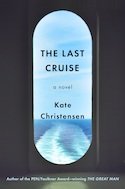
Less a crime novel than a novel with multiple crimes in it, Kate Christensen’s The Last Cruise (Doubleday) follows a handful of characters — a New York journalist-turned-Maine-farmer and her journalist bestie, a quartet of aging Israeli musicians, an ambitious chef — as they join an iconic ship for her final cruise between California and Hawaii. Trouble below deck kicks off early on, but overriding the thrilleresque plot is a quietly stunning book about power: the abusive power of ego; the generationally-channelled power of anger; the mighty and physical power of the ocean; the reinforcing, embracing power of lifelong relationships; the survivalist power of deeply-embedded training; and the redeeming, soul-quenching power of music and words and love. Excellent.
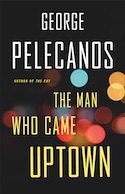
The Man Who Came Uptown by George Pelecanos (Mulholland) is rich with characters you want to spend time with: Phil Ornazian, a private investigator, and Thaddeus Ward, a retired cop, share a lucrative side-gig of robbing from the bad guys – pimps, white supremacists – to give to the baddies’ victims (and to themselves); Michael Hudson, newly un-incarcerated and treading the straight-and-narrow with cautious optimism; Anna Byrne, idealistic and approaching her own pivotal crossroads; and, neither last nor least, the thrumming city of Washington, D.C.. With these characters, Pelecanos has crafted a tale rife with certain inevitabilities as well as out-of-left-field surprises as worlds overlap, collide, and mesh. There’s criminal violence here, but also a gentle, steady tone that carries the story forward and, inherent in every page, a wise and wonderful tribute to the transformative energy of books and reading.
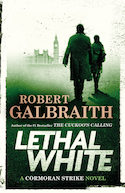
JK Rowling is clearly having as much fun writing her pseudonymous Robert Galbraith series of novels as she did while bringing the world of Harry Potter to life. Lethal White (Little Brown), the fourth book to feature the private-investigative work of Cormoran Strike and Robin Ellacott, gleefully tackles — against the hyperactive background of the 2012 Olympics — the hallowed world of London’s Houses of Parliament and the still deeply-entrenched English class system. Armed with a wild tale of a long-ago murder as well as a case of potential blackmail on their hands, Cormoran and Robin find themselves hobnobbing with people whose nicknames tend towards ‘Izzy,’ ‘Fizzy,’ ‘Torks,’ ‘Pringle,’ ‘Flopsy,’ and ‘Pong.’ As Cormoran notes under his breath, “‘Jesus Christ….It’s like interviewing the Teletubbies.’” A cracking read, wisecracks and all.
The Quintessential Interview: Stuart Turton
Stuart Turton’s debut novel, The 7 1/2 Deaths of Evelyn Hardcastle (Sourcebooks Landmark), is mind-boggling in the best way. A mash-up of imaginative gems such as Agatha Christie, time travel, and television’s sci-fi viewing pleasure Quantum Leap, the locked-estate mystery finds one Aiden Bishop persistently trying to solve a murder by embodying various host-bodies made up of fellow houseguests. In a shiver-inducing Groundhog Day aspect, the victim will die every day until Bishop figures out who’s who and what’s what. Even creepier is the creepy guy with the knife, creeping around in a seriously dastardly fashion. There’s plenty of humor in Turton’s clever tale, but some seriously unfunny business as well.
What or who are your top five writing inspirations?
It's funny, I've never thought of myself as being inspired, because I've wanted to do this for as long as I remember. My book is very much an Agatha Christie novel and I've wanted to write it since I was eight, so let's put Agatha up top. After that it gets a lot more prosaic. I write everyday because I'd go mad if I didn't; because I'd have to get an office job if I didn't; because the electricity company doesn't take 'following your dreams' as payment; and because I can't do anything else.
Top five places to write?
My study, which is just a desk, a computer, and a wall covered in plot-organising post-it notes. I hate clutter, so this is my favourite place ever. I seem to write well on long flights for some reason, so let's add that. And I always try to write in a place that has some connection to the story I'm telling. For 7 1/2 Deaths, it was a massive, decrepit manor house in the south of France which I crept around by night with a candle in my hand, scaring myself silly. It was awesome. I'll finish the list with a couple of places I like being when I look up from my screen, which includes any bar and my parent's house,
Top five favorite authors?
Depends on the day I'm having. In constant rotation are Arundhati Roy, Claire North, Franz Kafka, Raymond Chandler, and Iain Banks.
Top five tunes to write to?
Can I cheat and give bands instead? Wolf Alice, The National, St Vincent, Black Honey, Anna Calvi
Top five hometown spots?
My hometown, Widnes, is famous for making chemicals and having one of the highest rates of cancer in the country, so it's sorely lacking in nice places to visit. I rarely go back but, when I do, I tend to rotate between my parent's house, my favourite pub, The New Inn (I've been going there twenty years and I'm certain they've still got the same bar mats on the tables), the public library (which is now only open three days a week, a fact which damns our current government), the three charity bookshops in town, and the old market, where I like to eavesdrop on the local scandals.
Thursday Comics Hangover: Women strike back
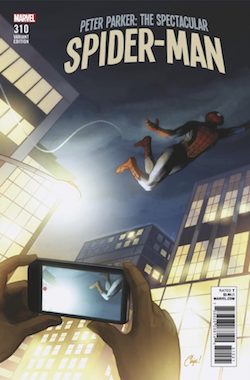
It was a jam-packed new comic book day at comics shops yesterday, with everyone rushing to read the first issue of Tom King's superhero-mass-shooting crossover Heroes in Crisis and the latest issue of the Watchmen crossover series Doomsday Clock. Those are big, serious adult superhero stories — you can tell by all the blood and dead bodies and nudity — though neither of them are anywhere near as moving as Chip Zdarsky's final issue of Peter Parker: The Spectacular Spider-Man, which is number 310 in the series.
If you enjoy the character of Spider-Man, I can't recommend this issue enough. Zdarsky perfectly nails down what makes Spider-Man so fascinating: he's funny, but he's also incredibly annoying. He's kind-hearted, but he's also a little bit obsessive. He finds ways to help people in need that go far beyond the standard superhero fare, and this story — which you can read without first reading any other issues of the book — highlights both his strengths and weaknesses in turn. I wish more superhero comics were this tightly constructed, and moving, and fun.
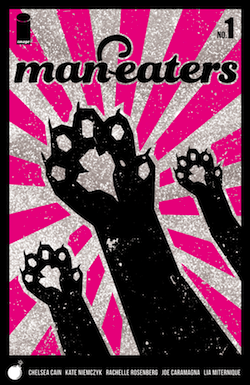
But the highlight of the week for me is the first issue of Man-Eaters, a new series by Portland author Chelsea Cain. Illustrated by Kate Niemczyk and colored by Rachelle Rosenberg, Man-Eaters is the sci-fi story of an epidemic that finally makes men as terrified of women as women have traditionally feared men.
If that sounds like a horror comic to you, you should know that Man-Eaters is very funny, too. Cain and Niemczyk are remarkably inventive here, telling the story through traditional narrative comics and graphs and photorealistic effects and other wild experiments in visual narrative. There's a lot of exposition here, but the storytelling is so exuberant that none of it feels like a chore to read.
Cain seems to inherently understand what it is that makes comics so great: unlike novels, comics can relay a tremendous amount of information in a single image that takes a second or two to read. Niemczyk and Cain are so good at relaying that information that a reader might have to force themselves to go back and read the first issue several times, just so they can fully realize how information-dense it is. In a week where superhero comics are trying (and in some cases failing) to address very real issues like trauma and the impact of violence, Man-Eaters is tackling misogyny head-on, and making it look effortless.
Bryan Menengus at Gizmodo got a copy of an anti-union training video Amazon shows to managers at Whole Foods. Gizmodo, smartly, didn't publish the video directly because doing so could inadvertently reveal the identity of the employee who leaked it to them. Instead, Menegus describes the video in great detail.
Here are a few of the (extensive) examples “that can indicate associate disengagement, vulnerability to organizing, or early organizing activity,” according to the video:
Use of words like “living wage” and “steward”
Distribution of petitions and fliers
Associates raising concerns on behalf of their coworkers
Wearing union t-shirts, hats, or jackets
Workers “who normally aren’t connected to each other suddenly hanging out together”
Workers showing an “unusual interest in policies, benefits, employee lists, or other company information”
Increased negativity in the workplace
“[A]ny other associate behavior that is out of character”
I worked at a Walmart briefly two decades ago, and this Amazon video sounds shockingly similar to the anti-union video they showed to all employees who started at Walmart at the time. The next time you buy a product from Amazon, I hope you'll recall the fact that the company is widely distributing a video that considers employees being concerned for one another to be suspicious — a video, in fact, that declares the words "living wage" to be a bad thing. Amazon is no better than Walmart when it comes to the way it treats its low-level employees.
Book News Roundup: Three posts
- Lindy West's next book, The Witches Are Coming, will be published in May of next year. The cover is fantastic:
- Ian Buruma, the editor of the New York Review of Books, (no relation) either stepped down or was pushed out of his position after he published a very irresponsible and very self-pitying essay by Jian Ghomeshi and then defended the essay in the laziest way possible in an interview with Slate. But now over a hundred authors, including Ian McEwan, Joyce Carol Oates, and Lorrie Moore have come forth in Buruma's defense. The authors cite the essay, and not Buruma's damning interview, as the reason for his dismissal. Michael Kupperman is exactly right in his tweet: this is the worst kind of elitist wagon-circling. Just because you personally like someone doesn't mean you have to stand up for his horrible decisions.
Wow! Never before have i lost respect for such a varied group of people so instantly. pic.twitter.com/BbXzqWMEGn
— MKupperman (@MKupperman) September 26, 2018
- Here's a good thread of writing advice, started by Tayari Jones:
What advice have you gotten from a writing professor or metor that you've never forgotten?
— Tayari Jones (@tayari) September 23, 2018
Talking with Lit Crawl Seattle's planners about their goal to "change...how Seattle views itself"
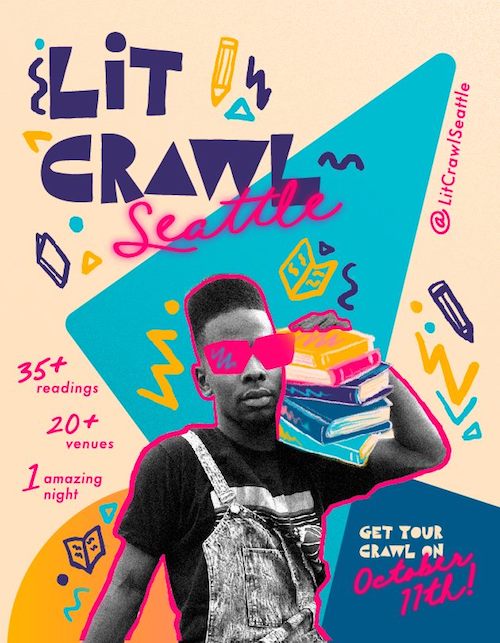
You're already saving the date for Thursday, October 11th, right? That's the night of Lit Crawl, which is arguably the biggest single event on Seattle's literary calendar — 40 events spread over dozens of venues in one night all across Capitol Hill, with a big dance party to cap it all off.
But you should also save the date for Thursday, October 4th. That's the kickoff fundraising party for Lit Crawl at Capitol Cider, with cocktails, an auction, a raffle, and live entertainment.
Last night, I talked with Lit Crawl managing director Jekeva Phillips and programming committee member Anastacia-Renée about what they have planned for this year's kickoff party and the Lit Crawl itself. The two writers are impossibly busy in their day-to-day lives — Anastacia-Renée is Seattle's Civic Poet and a prolific author, while Phillips is the publisher behind Word Lit Zine and many other projects — So I wanted to know how they also managed to put together the busiest day in Seattle's literary calendar year. What follows is an edited transcript of our conversation.
Is this your first year in your current role at Lit Crawl?
Jekeva Phillips: No, I was managing director last year, and this will be my fourth year. I started out at Lit Crawl as a volunteer, handing out pamphlets to folks and directing lines. The year after that I was invited to be a part of the venues and volunteers team, and then the torch was passed.
So that's kind of how I came to be where I am: Slowly but surely going from volunteer to managing director over the course of a couple years. Last year, my first as director, was a lot of fun. It's really interesting on this side of the fence.
Anastacia-Renée: It's my first year being on this side of Lit Crawl. In Seattle, I'm always trying to be the underdog who makes change. And I felt honored that Jekeva asked me to be the part of the programming committee because I felt like that was another way I can make change. I don't mean change in terms of previous Lit Crawls — I mean change in terms of how Seattle views itself.
First of all, I think Jekeva Phillips is one of the most underrated African-American/POC makers and changers in the city. Jekeva does a lot of work, and I don't think she is recognized in the way that she should be. When I heard Jekeva was involved, I said "I want to do that."
Second of all, I think Seattle gets set in its ways — there's a certain idea of what it means to be a professional writer. As Seattle Civic Poet, and someone involved at Hugo House, I've been trying to tell people, "you are missing out on some of the best writers and artists in this city because you have this small point of view of what a professional writer is." Lit Crawl gives me an opportunity to say that just because you don't know about this writer, or because they don't have fifteen books published, or because they're not a cis white male, doesn't mean they're not amazing. I get to help show the community what they're missing.
Jekeva Phillips: Anastacia is always so warm and giving and she always sees the brilliance in people. That's what I wanted to bring to Lit Crawl: different kinds of POC voices, queer voices, trans voices. There are so many writers hiding in the margins of the city, and it takes the kind of person who cares about people like Anastacia does to give them a chance. We love those voices, we love to say "hey, this person is awesome and we should put them on the same platform as everyone else."
For one night we just share our love of books and poetry and nonfiction. We all kind off come together. it doesn't matter if you're a sci-fi writer or a literary fiction writer — we're showcasing that there's always something for everybody, and everybody's got power.
What do you think makes a great reading?
Anastacia-Renée: I really appreciate when I can traverse genres. Even though I'm a cross-genre hybrid writer, people always ascribe me to poetry. But I write non-fiction, I write flash fiction. We're all writers. We don't have to stay in our little compartments. Genre freedom is a must. Free the genre! Free the nipple, free the genre. That's the title of your piece right there. We can be together — we can actually be together on one stage and share our work.
Jekeva Phillips: I also wanted to say everyone has done such a great job and it's been so much fun. It's a great team: Vi Tranchemontagne does programming and venues, Kathleen Flinn works on programming, and Julia Hands does our marketing and PR. It is such a labor of love and we all are laughing all the time. Together, we really put together a really great program.
We'll have over 40 events in one night in different venues. It's very stressful when you think about it that way, but there's no drama. We push boundaries, and we support each other creatively.
Anastacia-Renée: I totally agree. I've been a part of other committees, and I think there's a feeling here of camaraderie and a feeling that I'm safe. I've been a part of committees where i didn't feel safe — I had the sense that I was there only because of tokenism. Here, there's a shared vision of awesomeness — the amazing feeling when you want everyone to succeed.
Jekeva Phillips: Seattle gets caught up in a set way that we think about what it means to be a writer, and we try to challenge that at Lit Crawl.
I really love Katy Davis's design for our poster this year. I wanted something that makes books fun. I don't understand why we think about books as being this nerdy, educated highbrow thing. We should think about books as something fun. They're cool. You know, I've read all the classics, I'm not pooh-poohing them. But I wanted something that's fun, that's urban, that's engaging with a cool vibe. I want people to think about books the way they think about TV shows and bands.
Anastacia-Renée: I think the poster totally captures the feeling of Lit Crawl. I think music-lovers get it more than writing lovers. You don't see anyone saying, "this kind of music is actually the only real kind of music," or "I don't know, I'm only listening to such-and-such right now."
I need writers to get on board with this: The other arts have diversified what they think is special and good. You go to a museum and it's not one kind of art. It's not one thing. It's a lot of different kinds of art.
This is what i love about Lit Crawl: When you think about it, it's the one time of year when I feel that you get the whole Seattle experience for free in one night. It's actually kind of amazing. I know you can't print this, but it's fucking fantastic.
Jekeva Phillips: A big reason why it's free is because of our fundraiser on October 4th. We have fun things we're going to be auctioning off — items with different price ranges. We'll have things on the cheaper side that are better for our writer and artist friends, but we'll also have items like a voiceover class and different works of art.
We wanted to bring some fun stuff to the Lit Crawl fundraiser kickoff party this year, which is why we asked Briq House. She's a body-positive burlesque performer, and she'll be doing a literary/Halloween-themed burlesque dance. We love books, but we also love to party.
Anastacia-Renée: We writers are not all sitting by windows counting sparrows. We like burlesque and we love fun.
Every Lit Crawl, I discover at least one writer who just completely blows me away that I've never seen before. Where do you find these folks?
Jekeva Phillips: I go to a lot of readings and so does Anastacia. And I'm going to give a lot of credit to our programming team.
There are whole communities up in Everett and Lynnwood that are doing great things, and if they can come down here for one night and showcase those skills, maybe people from Seattle will start visiting them.
Anastacia-Renée: I think my specialty is finding people who are gems who have not been asked by Hugo House or Jack Straw or Elliott Bay. In fact, I make it my mission. My mission is to find the gems that you don't even know are gems. And then I'm interested in what would happen if two people who are totally opposites read together. Those are my two strengths. I don't always set out to look for POC readers or queer readers or trans readers, but those are often the gems who need recognition.
Jekeva Phillips: Talking about what you said about being blown away: I think the best events always linger. When I leave the reading, I can't forget about what they read because their perspective is fresh. They demand an audience.
Anastacia-Renée: Going back to the music analogy, if you really like a band, you're not going to keep them to yourself. No — you're going to tell people about them. I feel that way about really great readings, too.
Mail Call for September 25, 2018
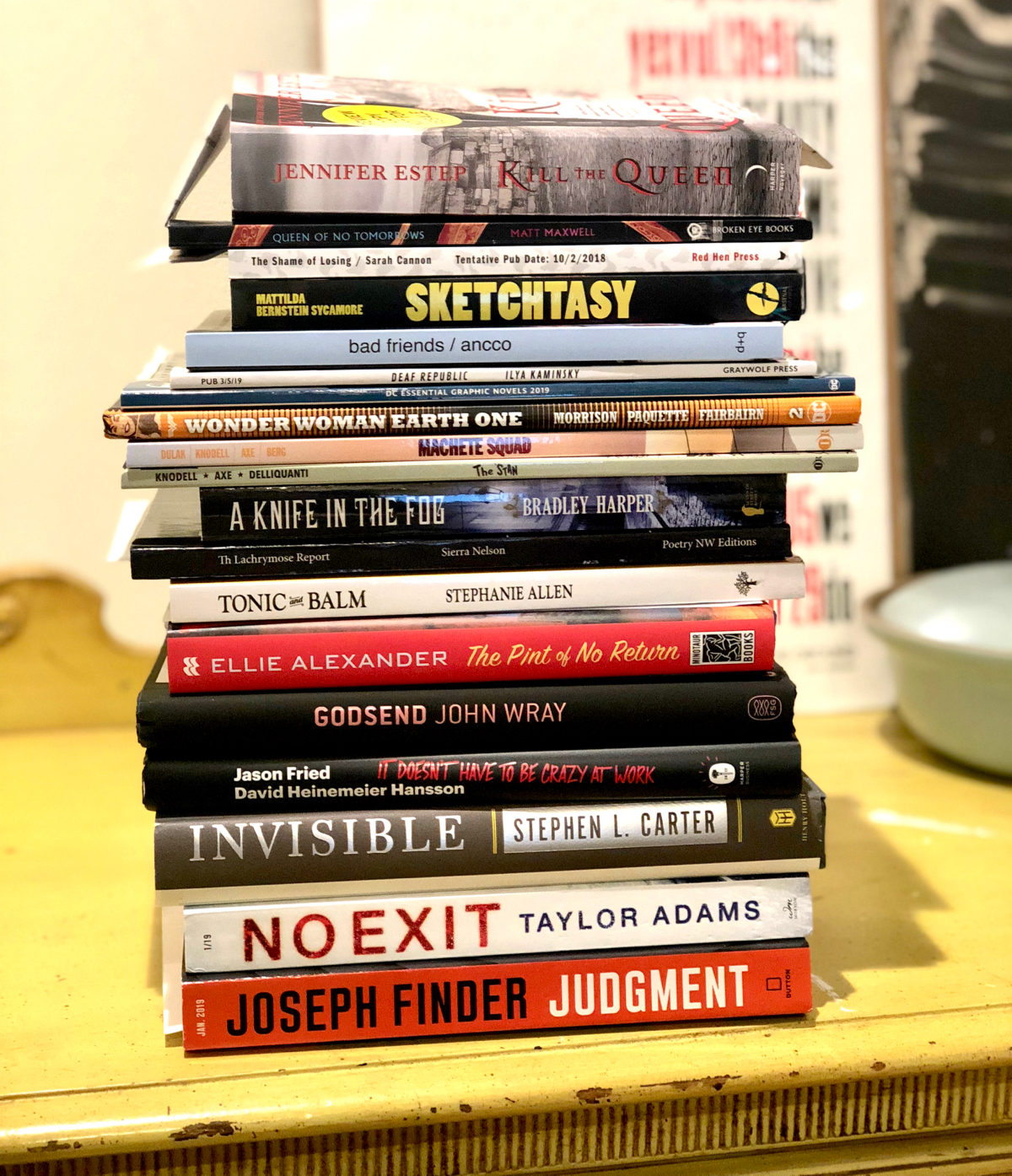
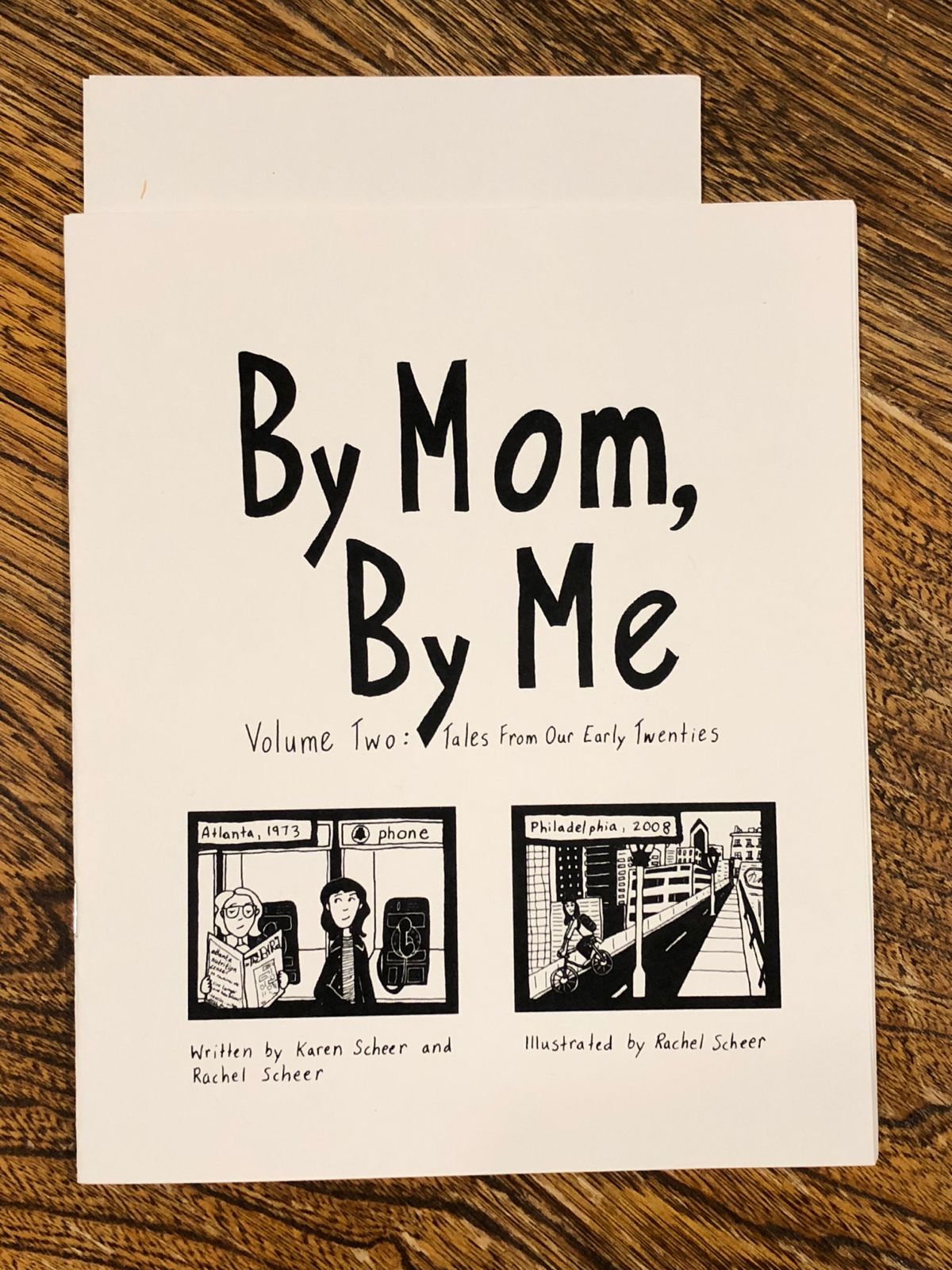
The Seattle Review of Books is currently accepting pitches for reviews. We’d love to hear from you — maybe on one of the books shown here, or another book you’re passionate about. Wondering what and how? Here’s what we’re looking for and how to pitch us.
Against fictional sprawl
I've suspected for a while that novels are getting longer, and this editorial from the Guardian confirms that suspicion: "One book survey found that the average number of pages had increased from 320 to 400 pages between 1999 and 2014." I can understand why novels are getting longer. In a time of increased distraction, it makes sense to advocate strenuously for concentration, to embrace the length and immersion of novels as a selling point, not as a hindrance.
But, really, though: come on.
Most novels, simply, don't need four or five hundred pages to make the point the author wants to make. I'm not arguing that books should compete with Twitter and other distractions in this age of short attention spans. Books are books and apps are apps and people like those two things to be separate and distinct.
But it's important to remember that audiences are immersed in narratives from morning to night, and we thoroughly understand how stories work. We don't have to observe every moment of your character's journey in vivid detail. In fact, at a time when everything in the world is overexplained from a billion different angles and dissected in a trillion think-pieces, we crave nuance and understatement. And nuance and understatement are just as valid a facet of the literary experience as sprawl and immersion.
I recently struggled through a very funny and interesting new novel by a popular literary author that could easily have lost a hundred pages. What's more, it would have been a funnier and more damning indictment of post-Trump America at that size. (Fine, I'll stop being precious: Gary Shteyngart's Lake Success is a clever, slim Thomas Berger-style satire trapped inside the bloat of a later Joyce Carol Oates novel. I enjoyed the book for long stretches, but I can't recommend it to anyone but Shteyngart's fans because it's so sluggish.)
I'm not calling for anything so draconian as page limits for fiction, but I do agree with the Guardian that a renewal of editorial power would be great for literature. Someone needs to ask authors when they turn in a 500-page doorstop about the interior life of an American family: "could this manuscript lose 40 pages without damaging your message?" And then "could this manuscript lose 40 more pages of needless description and unnecessary action?" And then "could this manuscript lose 40 pages of action that the reader could fill in herself?" And finally "hey, how about cutting 20 pages of theme-work? Seems like you could get the point across more sharply with fewer words!" Trust the reader to make the leap, rather than building an unnecessary bridge every time.
Novelists, you need to revive your killer instinct. American novels have become too long and too self-indulgent. Respect your readers' intelligence — and value their time, too.
Hey jealousy
Published September 25, 2018, at 11:55am
French writer Amélie Nothomb has written a fairy tale of a novel about jealousy between women — a woefully under-examined facet of everyday life.
Bed Bugs
The boat, full hold,
runs in deep cold.
In dusk’s fo’c’sle
we crewmen wearsheer sleep and hear
snores. Dream of beer,
the slightest fear
of dawn, the workday brings, its jerk
hard. This murky
night, Skipper skirts
Olalla Point,rubs swollen joints
and lucky coins,
wants to anoint
the autumn’s plum-dark with light rum,
chooses milk, hums,
broods as it un-
ravels white threadsin coffee. In bed
we sleep, bugs feed,
skitter on heads,
hands, hearts, and sinktorch tongues in skin
glass smooth and thin.
Little beasts, pin
puncture mouths. Ache.See how we wake
naked, how we find
the smallest butcher
making of us meat.
Captain Ginger saves the universe
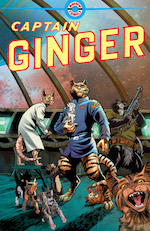
AHOY Comics is back to sponsor the great reviews and essays you'll see this week and to promote their new title, Captain Ginger: Thirty-five pages of comic adventure — with a bite — by writer Stuart Moore (Deadpool the Duck, Batman: Noir Alley) artist June Brigman (Power Pack), inker Roy Richardson and colorist Veronica Gandini. Mike Allred calls it "INSANE, in the best possible way when one describes something as 'insane'!" And although dogs outweigh cats (pound for pound) on the Seattle Review of Books team, we agree Captain Ginger is something special.
And we've got something special from AHOY on the site — letters from writer Stuart Moore and famed comic artist Walter Simonson. Stop by our sponsor feature page to read, and check out a few pages from the book, and better yet. Then pre-order a copy from your local comics store.
Sponsors like AHOY Comics make the Seattle Review of Books possible. Did you know you can sponsor us, too? There are only two slots remaining in 2018, so grab this chance to get your stories, or novel, or event in front of our passionate audience. Take a glance at our sponsorship information page for dates and details.
